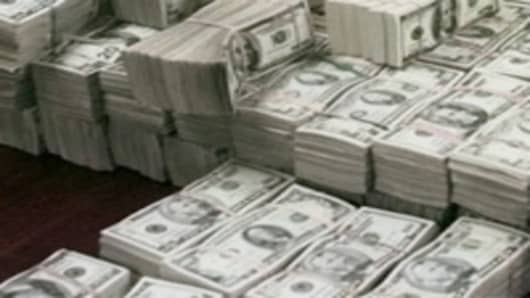Dividends are rising at many of our largest public companies, but cash accumulation is rising even faster. The dividend ratio—the percentage of earnings paid out to investors—has been falling for four quarters.
It’s now at its lowest level since 1936.
This is leading some market watchers to worry the companies with surplus cash will be tempted to waste it on poorly-conceived expansions or acquisitions. It would be better, some argue, if investors were given the cash and allowed to invest it themselves.
Especially in a period in which the “risk free” return on investment is so low—thanks to the Fed’s ongoing zero-interest rate policy—it is likely to be hard for companies to avoid attempting to juice returns on retained cash by engaging in riskier investments. As Daniel Peris, co-manager of the Federated Strategic Value Dividend fund, told the Wall Street Journal’s Jason Zweig for a column this weekend, "The likelihood of spending money poorly is increased by having a surplus of it."
So why are companies “hoarding” their cash? And why aren’t investors rising up against the corporate executives who are hoarding? This seems to be the new dividend puzzle.
The answer to both sides of this puzzle can probably be found in one recent event: the financial crisis.
The financial crisis revealed that the availability of financing for future business needs is far less certain than previously imagined.
The freezing up of short-term credit markets that many corporations use to finance things like payroll and inventories greatly increased the value of holding cash. In the next credit crunch, having cash on hand could make the difference between survival and failure.
The “cash hoading” also means that companies are not expanding all that fast. That may also reflect a fearful view of the future.
Ordinarily, falling interest rates indicate that there is an abundance of savings available for current investment and future consumption. But our low interest rates are very obviously a product of the Fed’s attempt to stimulate the economy. Executives at our most sophisticated companies are not under the impression that Americans are saving so much that they’ll have a lot of available cash to spend in the future.
The financial crisis also made many retail investors nervous. Add to that the lost decade in the stock markets—stocks have lost money over the past ten years once inflation and taxes are taken into account—and you have a recipe for investors who doubt that they can make better investment decisions than corporate insiders. So perhaps investors just aren’t demanding that corporate earnings get returned to them as dividends.
This nervousness about the wisdom of buying stocks can create another challenge for chief financial officers—they may find that attracting new capital with future stock offerings is too expensive. Many banks, for instance, learned during the crisis that they had to offer extremely expensive preferred equity to attract new capital. Better to have the cash on hand than to have to raise it from a capital market with tight purse strings.
Note that this logic applies not just to corporate managers but to current shareholders as well. Holders of common stock can lose out when new capital must be raised in expensive ways. So it makes sense from an investor perspective to permit larger cash holdings at the corporate level to avoid this potential hazard.
(As an aside: I think the dearth of IPOs is somewhat explained by this demand side phenomenon—investors just don’t trust that buying equities will earn an acceptable return—rather than exclusively focusing on supply issues—reluctance to go public because of Sarbanes-Oxley and such.)
When the supply of future capital and credit is uncertain, corporate survival may depend on a company's cash holdings. In effect, corporations face the same fears that many American households do—fear of a slowing economy, credit unavailability, loss of income—and respond in the same way: by raising their savings and diminishing their dependence of credit.
___________________________________________
Questions? Comments? Email us atNetNet@cnbc.com
Follow John on Twitter @ twitter.com/Carney
Follow NetNet on Twitter @ twitter.com/CNBCnetnet
Facebook us @ www.facebook.com/NetNetCNBC



